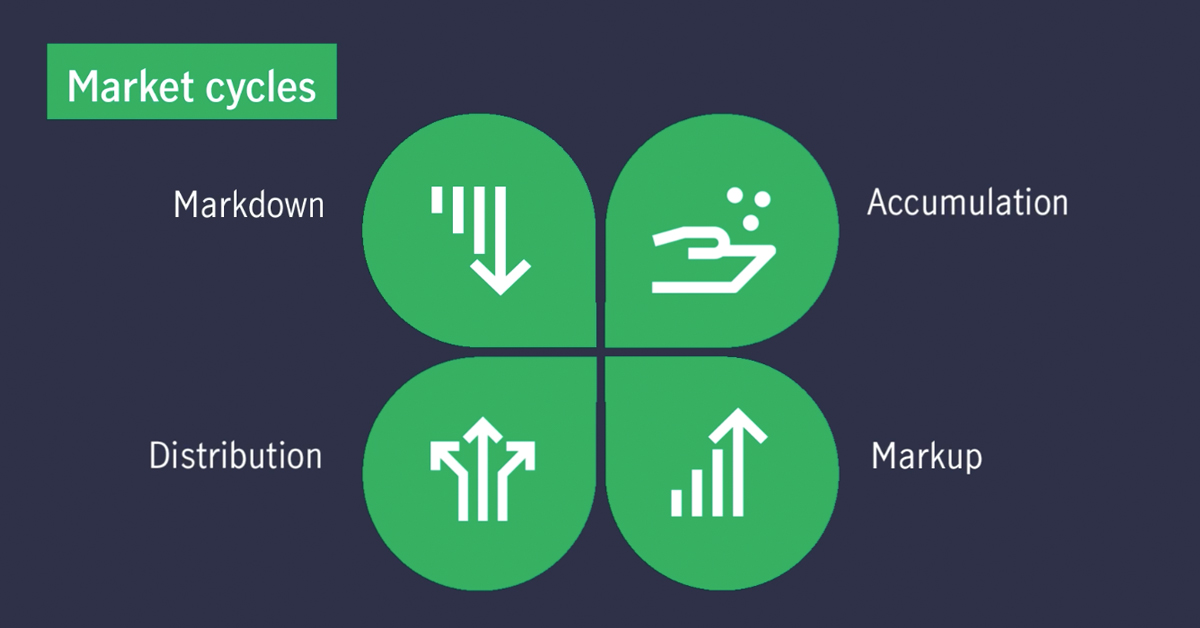Why the stock market goes up and down and what you can do about it
Centuries-old wisdom tells us to buy low and sell high—whatever it is we’re buying. But when it comes to the stock market, it’s not so easy to do. Stock market values go up and down from day to day, even minute to minute, making it difficult to know exactly what to do and when. We’ll break down some of the mechanics that cause all the changes and help you understand what it could mean for your own investment strategy.

Stock market values go up and down daily
When you look at the history of the stock market, over the long run, the value of the market has gone up.
The long view shows that the market grew from 2016 to 2025
As measured by the DJIA
Source: macrotrends.net/1319/dow-jones-100-year-historical-chart
This hypothetical example is for illustrative purposes only. Market performance is represented by the Dow Jones Industrial Average (DJIA), a price-weighted measure of 30 U.S. blue-chip companies. The index covers all industries, except transportation and utilities. Indexes are unmanaged. It is not possible to invest directly in an index. Past performance does not guarantee future results.
But in the short term, values can change quickly and frequently, often with no warning. These short-term changes make it hard to know the right time to buy and sell. And that’s why short-term trading and timing the market are best left up to the professionals.
Looking at a shorter period of time shows how much the market changes from day to day 2024–2025
As measured by the DJIA
Source: macrotrends.net/1358/dow-jones-industrial-average-last-10-years
This hypothetical example is for illustrative purposes only. Market performance is represented by the Dow Jones Industrial Average (DJIA), a price-weighted measure of 30 U.S. blue-chip companies. The index covers all industries, except transportation and utilities. Indexes are unmanaged. It is not possible to invest directly in an index. Past performance does not guarantee future results.
We’ll help you understand what can contribute to market volatility and how you can help plan and prepare for market fluctuations.
 With Emily Roland, Co-Chief Investment Officer, Manulife John Hancock Investments
With Emily Roland, Co-Chief Investment Officer, Manulife John Hancock Investments
What causes the ups and downs in the stock market?
The market is made up of thousands of stocks and other investment vehicles. Many factors can cause a single stock’s price to fluctuate, including:
- Company performance
- Market sentiment
- Interest rates
- Market cycles
- Geopolitical developments
Company performance
When a company is performing well, such as increasing sales and expanding operations, its stock price may go up. But if a company is unprofitable, closing locations, or going through layoffs, the stock price may decline in value.
Market sentiment
How people feel about a company, an industry, or the stock market overall can increase or decrease demand for it, making the price go up or down.
For example, when a stock index is growing in value, people tend to have a positive feeling and think the index and market will continue to grow.
On the other hand, when people question an industry’s future, as happened with airlines and cruises early in the pandemic, the stock prices of companies in the industry can decline even if they have a history of strong performance.
Interest rates
Interest rates affect how much it costs for companies to borrow money to expand their business. Lower interest rates mean lower interest payments, which can enable companies to take on loans to grow or improve their business. Likewise, higher interest rates may cause companies to postpone expansion and improvement projects.
Interest rates also have an impact on bonds. As interest rates increase, bonds become more attractive as the interest—or yield—paid by bonds increases. If investors favor bonds over stocks, stock prices may decline.
The market cycle
Stocks and industries tend to follow a four-phase market cycle: accumulation, markup, distribution, and markdown. Where the market is in its cycle can have an impact on prices.
- During an accumulation phase, stock prices reach their bottom and investors start to buy more shares for the long term.
- The markup phase occurs when investors are more confident that the worst is behind them, and sentiment becomes more positive as stock prices rise.
- Next comes the distribution phase, when the investors who have made money on their investments start to sell their shares. This is when people may start seeing a stock price as overvalued.
- Last is the markdown phase, when selling becomes more widespread, pushing the price down until people see a buying opportunity to transition back into the accumulation phase.
Geopolitical developments
What's happening in the rest of the world can affect the stock market. And although geopolitical risk typically has a more direct impact on companies outside the United States, it doesn’t mean we’re immune to it.
For example, if the U.S. government makes its laws or policies for trading with a certain country or region more restrictive, companies in those locations could suffer, while companies within the United States could benefit from less competition and their stock could rise.
How can you manage your retirement investments during market downturns?
Market downturns, also called bear markets, don’t last forever, but they do happen from time to time—it’s part of the market cycle. So you need to know what to consider when it happens.
Planning ahead can help, and one popular strategy that can be helpful is having a diversified investment portfolio.
Another strategy that could help you better prepare for a bear market is to keep a couple years’ worth of expenses available in cash or very conservative investments. This may offer you a buffer, so you aren’t forced to sell a stock investment when its value is low.
You should also consider how much time you have until you need your money—remembering that historically, over the long run, the stock market has gone up. So, if you’re concerned about your retirement savings, think about how long you have until you retire. In general, the further you are from retiring, the less reason there may be to react to a downturn today.
Your immediate reaction may be to sell, afraid the investment value will continue to drop. But remember the simple rule: Buy low, sell high. If you sell when the market is low, you lock in your losses. Consider sticking to your investment strategy and holding on to the investments you have, even in a bear market.
Dollar cost averaging
One of the reasons to stay in the market is a strategy called dollar cost averaging. When you invest the same amount regularly as you do with your 401(k) plan, your money buys more shares when stock prices decline.
Then if stock prices increase again, owning those additional shares might help the value of your retirement account increase that much more.
Here’s an example to help make sense of this.
- Let’s say you invest $250 every month, buying the same investment, no matter its price.
- Each month, you buy a different number of units, depending on the price.
| Month | Price of the investment | Month | Price of the investment |
| January | $10 | July | $12 |
| February | $8 | August | $9 |
| March | $4 | September | $5 |
| April | $7 | October | $6 |
| May | $11 | November | $10 |
| June | $12 | December | $11 |
- When the price is high, as it is in June and July, you buy fewer units; when the price is low, such as in March and September, you buy more units.
- When you look back at a year’s worth of investing, you’ve accumulated 386 units and your investment had an average monthly price of $8.75.
- But your actual average cost came out to only $7.77—because you bought more at low prices and less at high prices. That’s the potential benefit of staying invested and taking advantage of dollar cost averaging.
- At the end of the year, your $3,000 investment is worth $4,246 based on these hypothetical price changes.
Dollar cost averaging does not guarantee a profit or eliminate the risk of a loss. Systematic investing involves continuous investment in securities regardless of price level fluctuation. Participants should consider their resources to continue the strategy over the long term.
Expect market volatility and have a plan
The stock market is complex, and by its very nature, its value will go up and down frequently. And although it has historically gone up over time, making the wrong move can have a negative effect on your account balance. Understanding why the stock market goes up and down can help you stay calm and carry on when it does. And having a plan can give you something to lean on if you start to get nervous about your investments. Diversifying your investments can help shield you from some of the risk of market volatility, and keeping an eye on your long-term goal can help you focus less on the interim changes in value.
In our next—and final—article in the stock market series, we’ll discuss how you can put the investing concepts to work for your retirement savings goal—which, for many people, is their largest financial goal.
We’ll cover:
- Different types of retirement accounts,
- How to manage your investments throughout your career and as retirement approaches, and
- How you can research your investments.
Perspectives on market volatility
Visit our market volatility resource page for more helpful articles about the financial markets and the economy.
Important disclosures
Important disclosures
For complete information about a particular investment option, please read the fund prospectus or offering memorandum/trust document. You should carefully consider the objectives, risks, charges, and expenses before investing. The prospectus or offering memorandum/trust document contains this and other important information about the investment option and investment company. Please read the prospectus or offering memorandum/trust document carefully before you invest or send money. Prospectus or offering memorandum/trust document may only be available in English.
Neither asset allocation nor diversification guarantees a profit or protects against a loss.
There is no guarantee that any investment strategy will achieve its objectives.
Past performance does not guarantee future results.
All mutual funds are subject to market risk and will fluctuate in value.
It is your responsibility to select and monitor your investment options to meet your retirement objectives. You should review your investment strategy at least annually. You may also want to consult your own independent investment or tax advisor or legal counsel.
This content is for general information only and is believed to be accurate and reliable as of the posting date, but may be subject to change. It is not intended to provide investment, tax, plan design, or legal advice (unless otherwise indicated). Please consult your own independent advisor as to any investment, tax, or legal statements made.
MGR0815254715485


